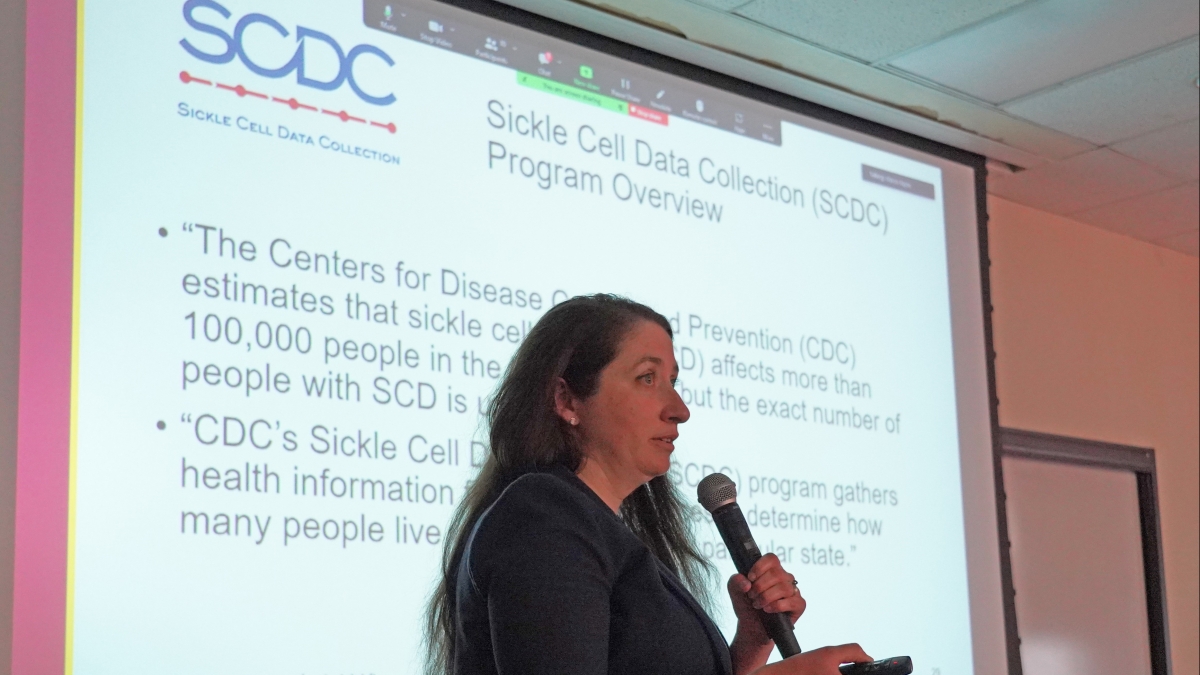ASU center hosts community gathering to discuss latest health research

Molly Loughran, senior data science specialist for CHiR, spoke about a partnership with Phoenix Children’s Hospital in which Arizona is brought into the Centers for Disease Control and Prevention's national Sickle Cell Data Collection Program on April 3. Photo by Keri Hensley/ASU
Communication and collaboration were front and center as Arizona State University’s Center for Health Information and Research, or CHiR, met with community partners and other stakeholders on April 3 to share information on its latest research and results from ongoing projects.
CHiR is Arizona’s first comprehensive health care data analytics repository of local health records, and has served researchers and policymakers by processing big datasets and providing expertise in deriving insights from big health data sources.
Marisa Domino, CHiR executive director and professor in ASU's College of Health Solutions, spoke about changes in the physician workforce during the COVID-19 public health emergency.
Arizona’s workforce grew during the pandemic years, but certain medical specialties were disproportionately likely to leave actively practicing medicine in the state.
Molly Loughran, a senior data science specialist, described CHiR’s partnership with Phoenix Children’s hospital, which brings Arizona into the Centers for Disease Control and Prevention's national Sickle Cell Data Collection Program.
The initiative will better quantify the size of the population with sickle cell in Arizona and create information on their need for services.
Nell Robbins, a senior data science specialist, spoke on Arizona Population Denominators, a partnership with the Arizona Department of Health Services to create and publicly provide data on population characteristics by age, sex, race and ethnicity by small areas across the state known as "census tracts."
These breakdowns are useful for public health programs and other initiatives that need to know the size of their target population in different areas of the state.
The presentations also sparked valuable discussions as the community partners and stakeholders in attendance talked about ways that research could be used in other situations.
“It was really exciting to see how impactful data can be to the community,” said Maureen Sharp, with the Arizona Health Care Cost Containment System.
Domino said the ability to interact spontaneously with others in person added to the event.
“... There’s no substitute for informal conversations: 'What are you working on? What’s important to you? What challenges are you facing?' We try to get to those questions in a coordinated space, but I think it happens more in these in-person meetings.”
More Health and medicine

ASU, Mayo Clinic forge new health innovation program
Arizona State University is on a mission to drive innovations that will help people lead healthier lives and empower health care professionals to develop novel new health solutions. As part of that…

Innovative, fast-moving ventures emerge from Mayo Clinic and ASU summer residency program
By Georgann YaraIn a batting cage transformed into a custom pitching lab, tricked out with the latest in sports technology, Charles Leddon and his Mayo Clinic research teammates scrutinize the…
Is ‘U-shaped happiness’ universal?
A theory that’s been around for more than a decade describes a person’s subjective well-being — or “happiness” — as having a U-shape throughout the course of one’s life. If plotted on a graph, the…